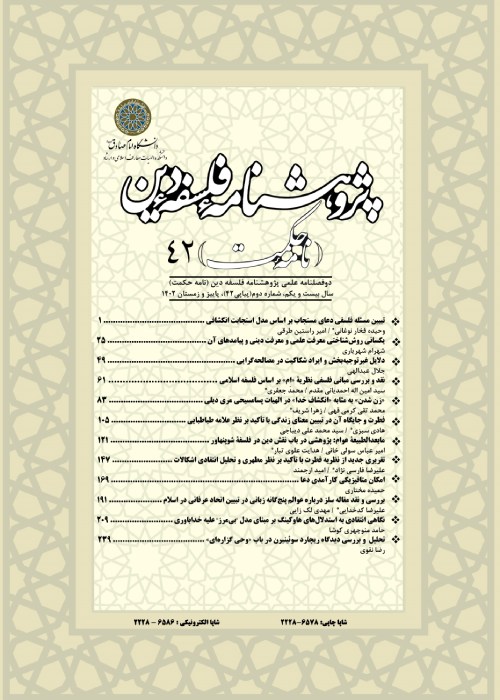A Comparison between Swinburne's and Mutahari's views on the Problem of Evil
Abstract:
The problem of evil، as raised by Mutahari and Swinburne، is one of the most important and complicated problems concerning belief in God and teleology of the world. Both of philosophers face the problem through the standpoint of “justice” as the most important divine attribute and، relying on divine grace and will، they seek to respond to it. The complexity of the problem of evil is mainly due to the logical method of putting forth the problem، which emphasizes incompatibility rather than mere contradiction. That is to say، supposing the existence of an omnipotent، omniscience، and wholly-good God، there is no justification of the existence of evil whatsoever. The present paper attempts to explore the problem of evil on the basis of two well-known philosophers’ views. These two thinkers seek to explain and justify evils on the basis of theodicy. This article discusses Mutahari’s views in two sections: discrimination and evils. His view about evils will be studied under three headlines: non-existence of evils، relativity of evil، and inseparability of good and evil. Besides، Swinburne’s views will be discussed in three sections: moral evil، natural evil، and animal suffering. Finally، two philosophers’ views will be compared in the headline of: the motivation for positing theodicy; the method adopted by two philosophers for positing the theodicy; the nature of evil; the classification of evils; the benefits of evils; the best created world and animal suffering. Then the article makes the conclusion that although both of philosophers agree upon emphasis on human will، existence of the best created world and the benefits of evils، they disagree about the nature of evil، the classification of evils، and about some justifications for the existence of evil. Therefore، the article attempts to explore the differences and similarities between the two philosophers.
Keywords:
Language:
Persian
Published:
Philosophy Of Religion Research, Volume:12 Issue: 2, 2015
Pages:
1 to 24
magiran.com/p1377151
دانلود و مطالعه متن این مقاله با یکی از روشهای زیر امکان پذیر است:
اشتراک شخصی
با عضویت و پرداخت آنلاین حق اشتراک یکساله به مبلغ 1,390,000ريال میتوانید 70 عنوان مطلب دانلود کنید!
اشتراک سازمانی
به کتابخانه دانشگاه یا محل کار خود پیشنهاد کنید تا اشتراک سازمانی این پایگاه را برای دسترسی نامحدود همه کاربران به متن مطالب تهیه نمایند!
توجه!
- حق عضویت دریافتی صرف حمایت از نشریات عضو و نگهداری، تکمیل و توسعه مگیران میشود.
- پرداخت حق اشتراک و دانلود مقالات اجازه بازنشر آن در سایر رسانههای چاپی و دیجیتال را به کاربر نمیدهد.
In order to view content subscription is required
Personal subscription
Subscribe magiran.com for 70 € euros via PayPal and download 70 articles during a year.
Organization subscription
Please contact us to subscribe your university or library for unlimited access!


